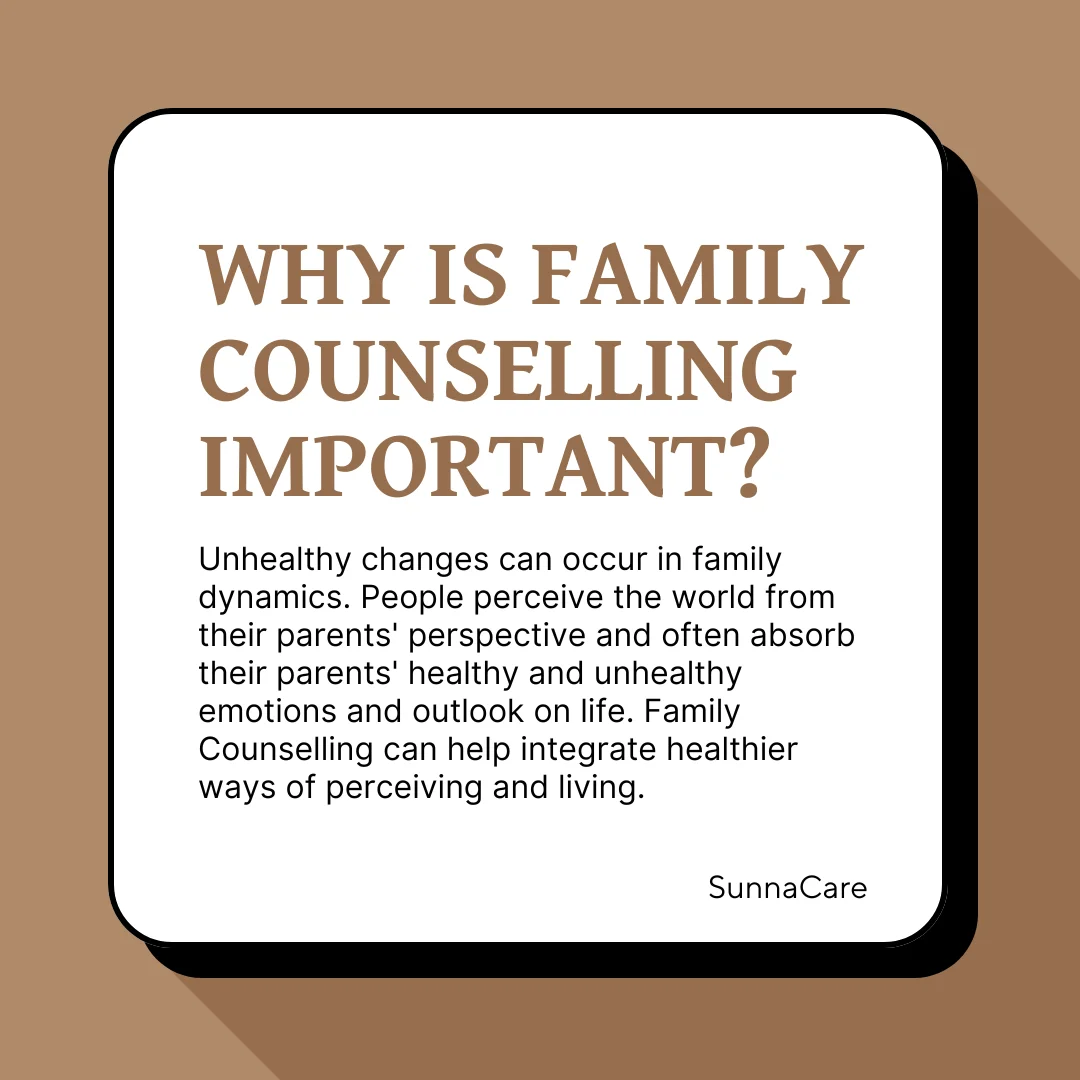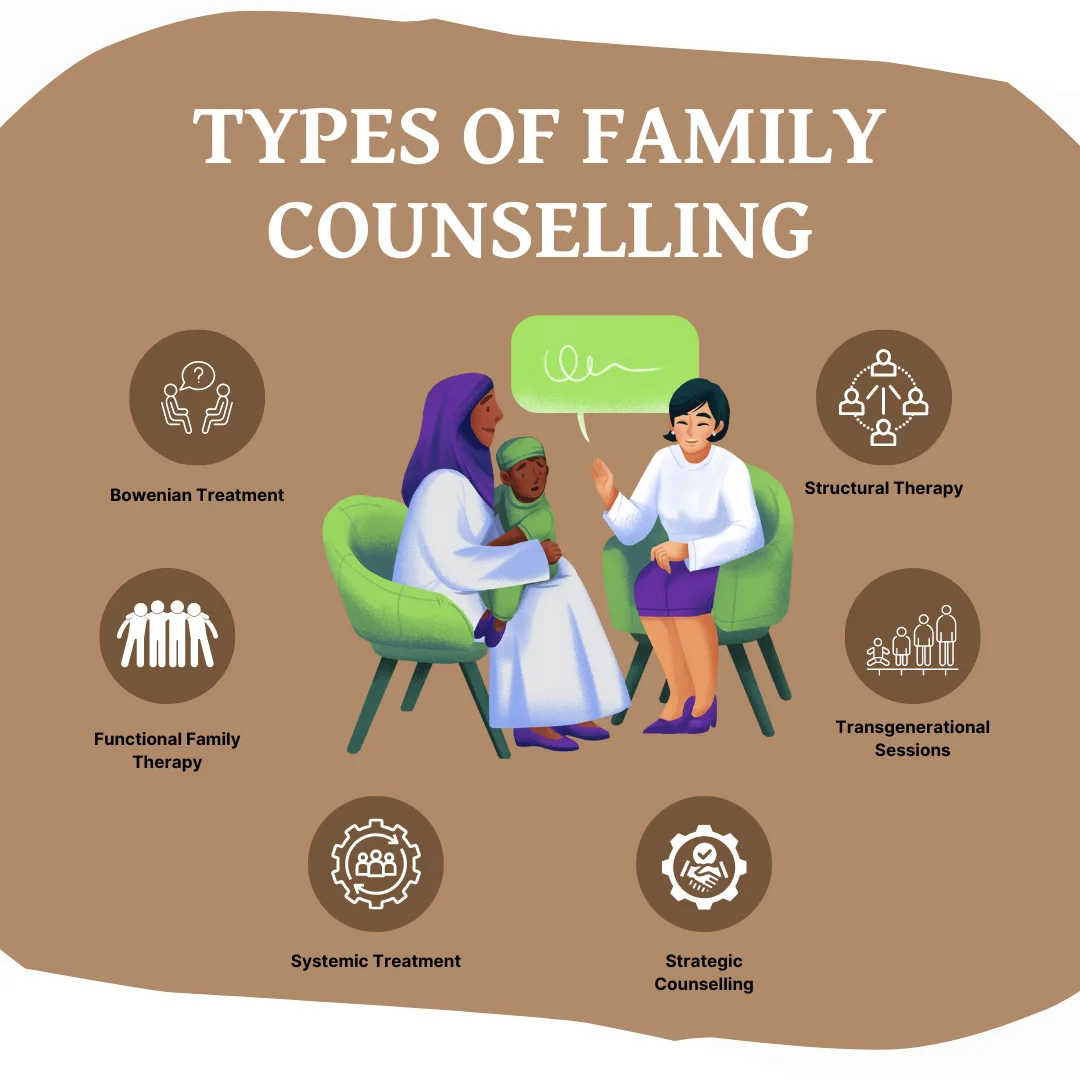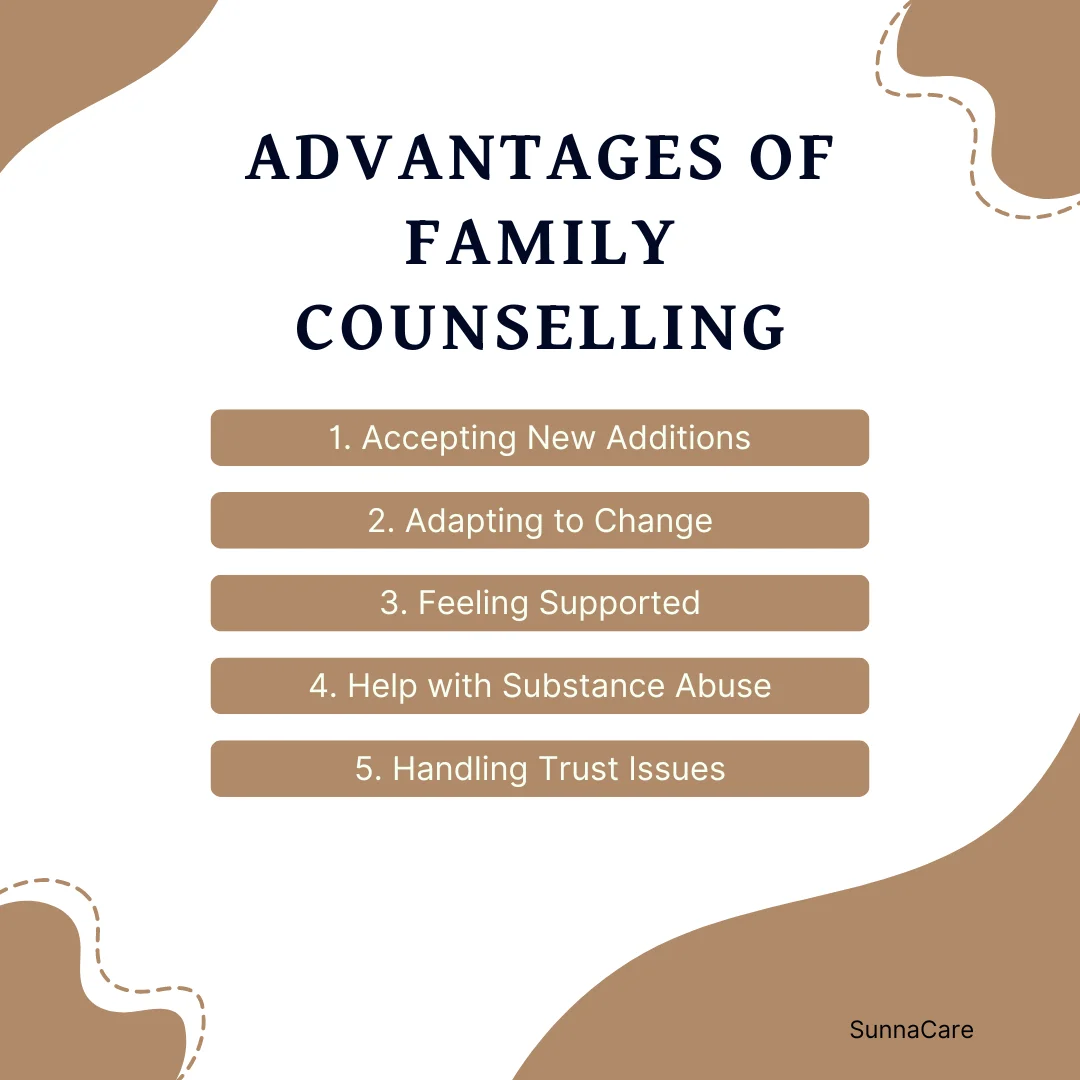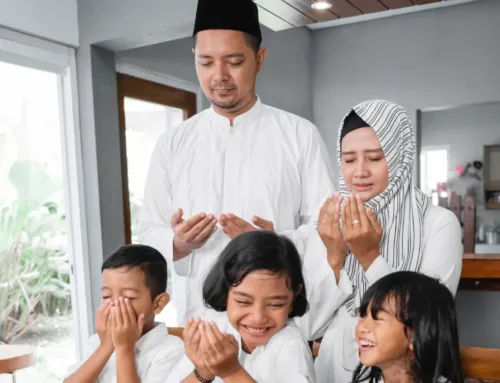What You Need to Know About Family Counselling Before Signing Up
What You Need to Know About Family Counselling Before Signing Up
What You Need to Know About Family Counselling Before Signing Up
What You Need to Know About Family Counselling Before Signing Up
Occasional conflict in the family is a natural part of life. We internalize our family values, habits and emotional experiences as we grow up. However, on-going problems within families can have an effect on your mental well-being and damage relationships.
Sometimes, such situations can bring dozens of equally pressing obligations.
It can cause shame, build resentment and lack meaningful relationships.
When one finds themselves tangled or confused; family counseling can help navigate these difficult times.
Learn More: 11 Journaling Ideas To Try For Self-Improvement
Why Is Family Counselling Important?

Unhealthy changes can occur in family dynamics. People perceive the world from their parents’ perspective and often absorb their parents’ healthy and unhealthy emotions and outlook on life. This tendency can create a cycle across generations, where these emotional patterns and perspectives are transmitted from one generation to the next over many generations.
As a response, some family members are unable to cope or are in emotional distress. People living in constant family conflict are also at greater risk for anxiety, depression, stress, anger management, drug abuse and other mental health disorders.
This can be our brain’s coping mechanism against traumatic events or problems within the family. A person’s altered behaviour can cause even more chaos within the family.
Even after a family member with a behavioural issue begins to rehabilitate, the family doesn’t naturally go back to their normal routines. Families may find it challenging to adapt to a family member who is healing or drawing boundaries.
Read More: How To Develop An Attitude Of Gratitude In 10 Steps
Types of Family Counselling

The four most popular forms of family counselling are generally Bowenian, structural, systemic, and strategic therapy.
Depending on the dynamics of the family members requesting assistance, each has advantages of its own.
So, let’s look at each type of family counselling:
1. Bowenian Treatment
The best candidates for Bowenian treatment are typically those who want to strengthen their bonds with family members without having them in the room during family counselling sessions.
Most of the time, not all family members are appreciative or in agreement of counseling or therapy. Or, it may be too embarrassing to be in the same room as one another.
The goal of Bowenian treatment is typically to teach the patient how to let go constructively and build emotional stability for themselves.
According to research, this type of family counselling was used on couples. And it increased happiness and empathy among the individuals involved in the experiment.
Bowenian therapy usually takes time, just like any other type of family counselling.
Generally speaking, clients of this type of family counselling should anticipate slow development.
2. Structural Therapy
In contrast to Bowenian therapy, it focuses more on the relationships inside the family rather than on an individual.
Both sides may benefit from assistance in fortifying their connections with one another.
In this type of family counselling, the therapist works to improve communication between the members of the family.
Making such positive adjustments may include restructuring the current order that functions in the family.
For instance, in a households, there may be a predefined boundary between parents and their kids and a patriarchal system. The therapist will look into the psychodynamic approaches (the unconscious force that drives the reactions of a person) that are not working out.
3. Functional Family Therapy
Families with a kid or adolescent with complicated emotional or behavioral issues can benefit from this type of family counselling.
The youngster may attend eight to thirty sessions with their parents or other caretakers. Usually, if the case is a tough one, the therapy may last for three months.
The sessions will teach families how to better manage their child’s behavior and enhance family dynamics.
4. Transgenerational Sessions
In this family counselling, a therapist looks at cross-generational interactions, like those between parents or other caregivers and their kids.
Traumas and their impacts are almost hereditary. They can pass from one generation to the future generations.
The goal of intergenerational therapy is to comprehend how the family’s current interactions or issues are influenced by the family’s prior responses to difficulties.
When problems and behavioral patterns continue throughout subsequent generations, transgenerational treatment can be helpful.
For example, the Jews that are born after the Holocaust still have a fear of another Holocaust and have postwar traumas. Due to this, some of them may feel the need to learn survival skills.
5. Systemic Treatment
One of the trickiest and most multilayered types of family counselling can be systemic treatment.
It is usually advised that relatives investigate the root causes of their problems and decipher the meanings underlying their behavior.
Depending on the nature of the family relationships and the intensity of the conflict, this procedure may be rather difficult.
Systemic therapy typically involves a more detached approach from counselors.
In this type of family counselling, the therapists put the clients in a non-judgmental environment so that they can freely discuss their viewpoints.
As the therapists help people sympathize with each other, people slowly move on from the traumas.
6. Strategic Counselling
The therapist carries out this type of family counselling briefly.
This is quite different from the last ones due to the main aim of it.
Strategic therapy involves the therapist giving the family members treatment-specified assignments.
More than a healing process, it works on the learning process of an individual. It teaches people to overcome their issues by finding the
The tasks usually have to do with the relationships and communication inside the family.
Additionally, the duties can be created to assist each relative in making better decisions, which may ultimately be advantageous to the family as a whole.
Throughout strategically planned family therapy sessions, counselors influence the decisions of the people.
Read More: How To Regulate Nervous System: A Guide For Muslims
Advantages of Family Counselling

Here are some of the common advantages of family counselling:
1. Accepting New Additions
It can be frightening to adjust into a new family. When two people or families choose to merge, it can be a difficult transition. With a new marriage, divorce, adapting to a new environment, new home, step-parent comes with many challenges.
Family connection therapy can be very beneficial.
Especially for children, as they may not be able to verbalize their emotions, but may be feeling disoriented. The whole process of attempting to form a bond with the children is like moving mountains for step-parents.
In such cases, family counseling can assist with transitions.
2. Adapting to Change
As a whole, a family may fail to adapt to a change.
Some of us find it difficult to adapt to the changes we see around us.
A person’s emotional and mental health may suffer as a result of these changes.
Examples of these changes include relocating to a new area, navigating a divorce or custody dispute, or experiencing loss within the family.
Families can get assistance from a psychotherapist in adjusting to these changes.
3. Feeling Supported
While it’s common knowledge that children going through adolescence often feel lonely.
It’s difficult for the youngster to go through emotions, changes, and the need to find oneself. Considering all the changes in their environment, parents fail to understand their children’s attitude shift.
The children who wanted constant attention from parents have started demanding privacy. The relationship built during this phase is important.
Youth begin feeling misunderstood and confused at this age, family counselling can benefit both parents and children.
Parents also tend to have disagreements on how to handle their changing child.
The entire family can discuss the problem and cooperate to make sure that all viewpoints are acknowledged and understood during family counselling.
4. Help with Substance Abuse
Addiction has a great impact on a family. It can make families feel helpless and angry. It can feel hopeless and confusing when dealing with someone with an addiction.
Drug misuse is a problem that affects relationships and overall well being of families. Love, compassion, and patience are some of the most powerful forms of support that a family member can provide, but we all know that this is difficult and does not always work.
Families are advised to seek counseling to help create healthy boundaries and understand their roles and responsibilities when dealing with someone with addiction.
5. Handling Trust Issues
Certain things you want to keep private, but in a family, honesty and trust are vital.
Not only can hiding secrets from your partner or spouse destroy your marriage, but it can also negatively impact your family.
You and your partner can better comprehend the problem with family counselling.
Family counselling can help people find closure and start over. However, if you are considering therapy, make sure to inquire about the therapist’s methodology.
They must be able to describe how they will assist your family in resolving the problems you are facing.
FAQs
When is it appropriate for a family to seek counselling?
When faced with obstacles, including poor communication, arguments, significant life changes, or managing a family member’s mental health or addiction concerns, families may think about counselling.
Who can consider family counselling?
Any family looking to strengthen their bonds or deal with challenges might benefit from family counselling. Families coping with substance misuse, mental health concerns, mixed families, divorce and remarriage, and other challenges are included in this.
What goes on in a family therapy session?
In a family counseling session, a therapist guides family members’ conversations to pinpoint problems, enhance communication, and seek solutions. The therapist may employ various methods, including problem-solving activities, role-playing, and communication drills.
What is the duration of family counselling?
The length of family therapy differs based on the particular problems addressed and the family’s level of development. While some families may see an outcome from longer-term therapy, others might just require a few sessions.
Will family counselling involve children?
Depending on the issues and the child’s age, family counselling may involve the child(ren). The whole family may attend some sessions, while only the parents or other designated family members may attend others.
In Conclusion
Communication is the key to the betterment of relationships. Family counselling works using the same formula.
Everybody has a part to play, and when they work together, they may encourage a change.
If you want to address and resolve your concerns under the guidance of Islamic principles, Sunna Care can help you.
Through the wisdom of the Holy Book and experiential knowledge, we can help get your family one step closer to wellness.



